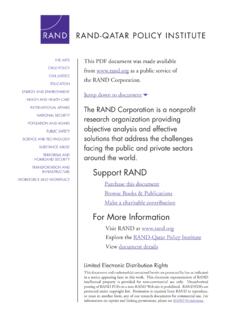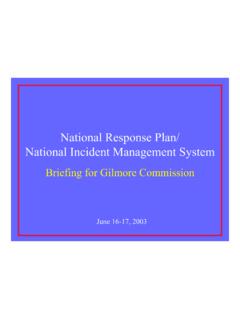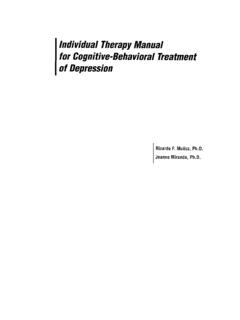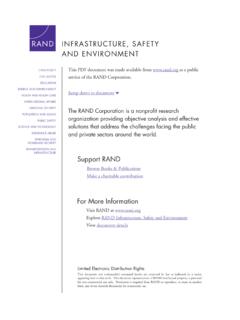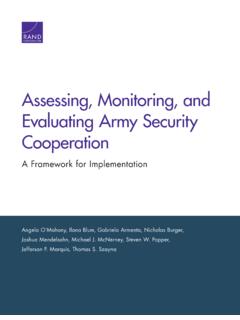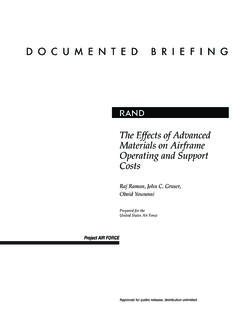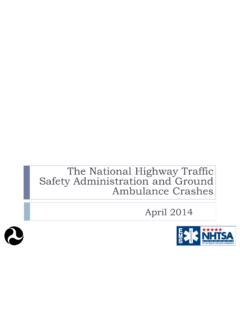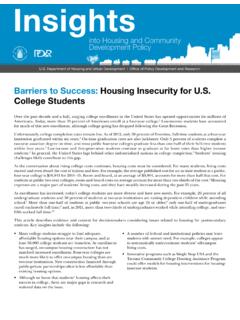Transcription of Terrorist Use of Cryptocurrencies - RAND Corporation
1 Terrorist Use of CryptocurrenciesTechnical and Organizational Barriers and Future ThreatsCynthia Dion-Schwarz, David Manheim, Patrick B. JohnstonCORPORATIONL imited Print and Electronic Distribution RightsThis document and trademark(s) contained herein are protected by law. This representation of rand intellectual property is provided for noncommercial use only. Unauthorized posting of this publication online is prohibited. Permission is given to duplicate this document for personal use only, as long as it is unaltered and complete. Permission is required from rand to reproduce, or reuse in another form, any of its research documents for commercial use.
2 For information on reprint and linking permissions, please visit rand Corporation is a research organization that develops solutions to public policy challenges to help make communities throughout the world safer and more secure, healthier and more prosperous. rand is nonprofit, nonpartisan, and committed to the public interest. rand s publications do not necessarily reflect the opinions of its research clients and RANDMake a tax-deductible charitable contribution at of Congress Cataloging-in-Publication Data is available for this : 978-1-9774-0234-9 For more information on this publication, visit by the rand Corporation , Santa Monica, Calif.
3 Copyright 2019 rand CorporationR is a registered report examines the possibility of more-widespread adoption of cryptocurrency by Terrorist groups by considering both the needs of such groups and the advantages and disadvantages of the cryptocur-rency technologies available to research should be of interest to a wide variety of stakehold-ers, including policymakers concerned with counterterrorism, those making decisions about international regulation and harmonization, and people who work with and invest in research was conducted within the International Security and Defense Policy Center of the R AND National Security Research Divi-sion (NSRD).
4 NSRD conducts research and analysis for the Office of the Secretary of Defense, the Joint Staff, the Unified Combatant Com-mands, the defense agencies, the Navy, the Marine Corps, the Coast Guard, the Intelligence Community, allied foreign govern-ments, and foundations. This research was funded through a generous grant from a private more information on the R AND International Security and Defense Policy Center, see or contact the director (contact information is provided on the webpage).vContentsPreface ..iiiTables ..viiSummary ..ixAcknowledgments ..xvCHAPTER ONEI ntroduction ..1 Focus of This Report.
5 4 Methodology ..4 Organization of This Report ..5 CHAPTER T WOHow Terrorist Groups Use Money ..7 Receipt ..8 Management and Transfer ..10 Spending ..12 Terrorist Organizations Current and Future Needs for Cryptocurrency ..14 Conclusion ..21 CHAPTER THREEL imitations of Current Cryptocurrency Systems for Terrorist Use ..23 Anonymity ..24 Usability ..27 Security ..28 Acceptance ..29vi Terrorist Use of Cryptocurrencies : Barriers and Future ThreatsReliability ..30 Volu me ..31 Implications of the Properties of Cryptocurrencies ..31 Conclusion ..35 CHAPTER FOURC yberattacks on Cryptocurrency ..37 Classification of Attacks Against Cryptocurrency Use.
6 38 Usefulness of Different Attack Types Against Terrorist Organizations ..41 Differences in Vulnerabilities for More Sophisticated Cryptocurrencies ..44 Conclusion ..45 CHAPTER FIVEF uture Viability of Cryptocurrencies ..47 Factors Increasing the Viability of Cryptocurrency Use ..47 Factors Decreasing the Viability of Cryptocurrency Use ..51 Conclusion ..53 CHAPTER SIXC onclusions ..55 APPENDIXC ryptocurrencies: A Short Primer ..57 Bibliography ..63viiTables Terrorist Organization Financial Activities ..xi Assessment of Terrorist Finance Activities with Respect to Cryptocurrency Properties ..xiii Terrorist Organization Financial Activities.
7 15 Assessment of Terrorist Finance Activities with Respect to Cryptocurrency Properties ..34 Types of Attacks Against Cryptocurrencies and Their Characteristics ..40ixSummaryGiven the key role of funding in supporting Terrorist operations, coun-terterrorism efforts in particular, the subfield of counterterrorism finance (CTF) often focus on tracking the flow of money through bank accounts and preventing financial transactions that might be used to support attacks and other Terrorist activities. However, the suc-cess of CTF strategies in reducing Terrorist access to fiat ( , govern-ment-issued) currencies has raised concerns that Terrorist organizations might increase their use of such digital Cryptocurrencies as Bitcoin to support their is both a protocol for securely storing and transmitting tokens (virtual coins) and the name of the unit of value in the system.
8 Bitcoin revolves around a public ledger called the blockchain, which is maintained by an online peer-to-peer network that tracks transac-tions and maintains a complete history of verified transactions. Media reports have outlined the notion that some, or even many, Terrorist organizations have unlimited, untraceable sources of digital money, such as Bitcoin, which will be used to undermine the successes of C T Policymakers also have raised concerns about Terrorist use of digital Heather Nauert, ISIS Parks Its Cash in Bitcoin, Experts Say, Fox News, Novem-ber 2011 ; Ian McKendry, ISIL May Be Using Bitcoin, Fincen s Calvery Says, American Banker, November 16, 2015.
9 Resty Woro Yuniar, Bitcoin, PayPal Used to Finance Terror-ism, Indonesian Agency Says, Wall Street Journal, January 10, House of Representatives, Financial Innovation and Defense Act, 4752, Janu-ary 20, Terrorist Use of Cryptocurrencies : Barriers and Future ThreatsHowever, the challenge posed by Cryptocurrencies extends beyond Bitcoin. Many new Cryptocurrencies have emerged in the past few years, including such alternative currencies (altcoins) as Omni Layer (MasterCoin), BlackCoin, and Monero, which are touted as more pri-vate and secure than Bitcoin. Zcash is another cryptocurrency that offers a higher degree of privacy and provides the potential ability to use and transfer currency offline, which could make it difficult for law enforcement to trace illicit transactions.
10 Other Cryptocurrencies have been proposed, including Hawk, which would allow fully private con-tracts and transactions on the Ethereum blockchain. Like Bitcoin, the Ethereum blockchain is a distributed computing platform and operat-ing is thus a great need to understand the full potential for Terrorist use of Cryptocurrencies , including options for identifying and tracking their use, the sophistication and technological capability of Terrorist groups, and the potential for such use to increase in the future, given expected technological report focuses on two key questions. First, we aim to under-stand whether Terrorist groups are currently using Cryptocurrencies to support their activities and, if not, why they are not using such curren-cies.

